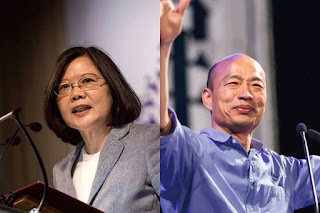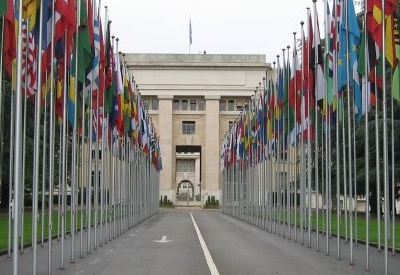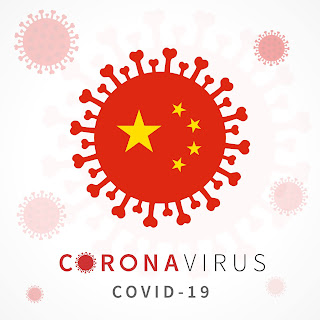Tsai poised to win majority in Taiwan on January 11
 |
| Tsai Ing-wen - Han Kuo-yu |
Taiwan was ruled by martial law from 1949 until 1987 that some officials estimate as a scourge of "...over 200,000 people that were killed, imprisoned, or otherwise victimized by the regime. 2
Taiwan has employed a de-sinicization program to reduce the reach of Confucianism and limit confrontation in Taiwanese society.
Currently, the DDP (Democratic Progressive Party) is facing the Kuomintang Party in the islands election on January 11, 2020. The Kuomintang Party was led by Chiang Kai - shek that ultimately enforced martial law when he and the ruling Party Kuomintang capitulated to Mao and the CCP after being defeated in the Chinese Civil War (1927 - 1949.) The current Kuomintang Party favours closer ties with the Mainland, although not in the pretext of the "one -country -two systems" employed in Hong Kong & Macau. For the DPP they must straddle the line between trade and autonomy- Chinese trade with Taiwan accounts for 96.7 billion USD (28.8%) and 41.6 billion USD with Hong Kong.3 A recent MAC (Mainland Affairs Council) Poll found that 27% favour independence, a ten year high. 31% prefer maintaining the status quo. 1.4% want unification, quickly, while ultimately, 8.9% desire unification.4
The "1992 Consensus" advocated for closer relations between Taiwan and Beijing, though the interpretation remains murky and is not transcribed as an official document. The ROC (Republic of China) had the text of the meaning of "one China" included by the National Unification Council, that no longer operates. The central government maintains that the spirit of the agreement is that Taiwan is part of China. This sounds suspiciously similar to the "Seventeen Point Agreement" that the central government,allegedly, brokered with Tibet in 1951.On the eleventh point, and one in which Taiwanese officials should pay close attention to: "In matters relating to various reforms in Tibet, there will be no compulsion on the part of the central authorities. The local government of Tibet shall carry out reforms of its own accord, and, when the people raise demands for reform, they shall be settled by means of consultation with the leading personnel of Tibet." Chinese officials from Mao to Xi continue to renege on the basis of this particularly meaningful point.
During Tsai's first mandate, the central government has purloined seven diplomatic allies from Taiwan, leaving Taiwan and U.S. relations on a client - patron basis with Taiwan - U.S. support augmented by The Taiwan Assurance Act of 2019. "The bill states that Taiwan is an important part of U.S. strategy in the region and urges the United States to conduct regular transfers of defense articles to enhance Taiwan's self-defense capabilities. The bill also sets out that Taiwan is an important part of U.S. strategy in the region and urges the United States to conduct regular transfers of defense articles to enhance Taiwan's self-defense capabilities."5
Tsai has been fore-warning voters on the campaign trail regarding the situation in Hong Kong and the principle failure of democracy under the "one country - two systems" mandate. "Ms. Tsai’s latest campaign video warned that Mr. Xi’s formula had failed Hong Kong, especially its youth. “Only a few hundred kilometers away, countless young people are being arrested, being locked up, being mistreated, being disappeared,” the narrator says, then adds. “From the beginning, ‘one country, two systems’ has been a dictatorship.” “Winning over the hearts of the people and doing well in work with the masses was always the Communist Party’s strong suit, our special skill,” the former deputy director, Wang Zaixi, said at the forum. “So why has it failed in the face of our Taiwan compatriots? Can you blame them?”6 Mass-line populism remains the method of communication from the central government to rally the masses. Taiwanese freedoms and message run counter to China. Hard to understand Wang's reasoning.
The DPP led by Tsai will maintain their position in the unicameral Legislative Yuan after Saturday's result. With the dollar at an 18 month high, Taiwanese can maintain the economic momentum that the DPP has built up.
Tsai Ing - wen secures second term with a decisive victory.

Tsai Ing-wen
(DPP)
8,170,231
57.1%

Han Kuo-yu
(KMT)
5,522,119
38.6%

James Soong
(PFP)
608,590
4.3%
Source: Taiwan Central Election Commission
Works Cited
1 Pye, Lucien. China: An Introduction. Harper Collins: USA. 1991.
2 Ihara, Kensaku. "30 years after martial law, a Taiwan transformed." Nikkei Asian Review. 20 July 2017. 9 January 2020. <https://asia.nikkei.com/Politics/30-years-after-martial-law-a-Taiwan-transformed>.
3 Workman, Daniel. "Taiwan's Top Trading Partners."World's Top Exports. 1 March 2019. 9 January 2020. <http://www.worldstopexports.com/taiwans-top-import-partners/>.
4 Central News Agency. "Over 27% of Taiwan people support independence: MAC poll."26 October 2019. 9 January 2020. <https://www.taiwannews.com.tw/en/news/3803943>.
5 Rep. McCaul, Michael T. [R-TX-10.] "H.R.2002 - Taiwan Assurance Act of 2019." CONGRESS.GOV. 05 August 2019. 9 January 2020. <https://www.congress.gov/bill/116th-congress/house-bill/2002>.
6 Myers, Steven Lee and Chris Horton."China Looms Over Taiwan’s Election, Giving a Boost to the Incumbent." New York Times. 8 January 2020. 10 January 2020. <https://www.nytimes.com/2020/01/08/world/asia/china-taiwan-hong-kong-protests.html>.




